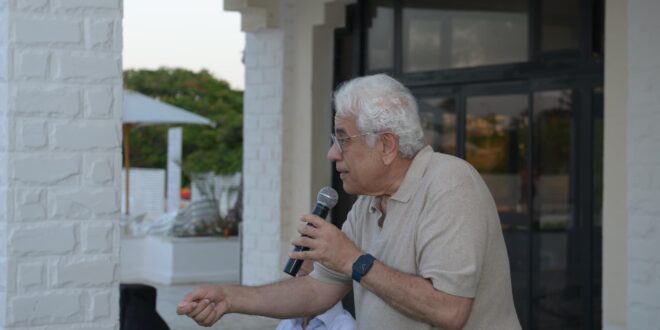At the invitation of the Social Committee of the Village of Diplomats on the North Coast, a symposium was held in the village’s social club, at the invitation of Mr. Mounir Abdel Nour, former Minister of Industry, Dr. They were headed by Ambassador Moushira Khattab, President of the National Council for Human Rights, Dr. Hossam spoke. On the future of knowledge in Egypt and the world, and on the difference between education and its traditional framework and learning and knowledge in a broader framework.
Dr. spoke. Hossam for departing from the stereotypical education that lagged behind the development of industry and technology and became unqualified to map the future of knowledge in its current form…..
The attendees asked him about the most important skills that young people need to work now and in the future?
He said: The three most important skills currently required in the labor market are: the ability to work in teams, communication and communication skills, and the ability to adapt to change.
In addition to them, the leadership skills that many jobs need at multiple levels..and of course this is in addition to digital skills, computer use, and knowledge of a second language besides Arabic.
And when one of the attendees raised that, of course, this is outside the scope of specializations such as medicine, engineering, law, military colleges, and practical colleges!
d said Hossam, these skills are needed by doctors, engineers, lawyers, officers, teachers and all disciplines. There is no place in the workplace today and certainly in the future for those who do not possess them.
d said. Hossam, no matter how much we repeat our efforts that we have been doing for years, the situation will not be fixed because we are repeating the same thing while waiting for different results, and the issue is not in the amount of spending, but rather in the philosophy of learning……. The issue is that the conscience of children and youth is being built. By living together, establishing normal human values, practicing the arts, especially music, sports competition, working as a team, and differentiating between the capabilities of students at every age stage… Vertical reform must be carried out in a critical size of the population in places that the state determines competitively so that growth can be measurable and repeated.
impact d. Hussam drew the attention of those present that most of those who influenced humanity did not enter schools, and that the school model that we insist on began in the eighteenth century and is still solid in its place despite the development of industry, agriculture and life around it.
Our children and youth stand on the same stage with their peers in the rest of the civilized world, and what hinders them is our generation and those who preceded us who want them to be copies of them….Knowing that the origin of schools at the beginning of their inception was to teach religion and to prepare armies, and the two goals of their philosophy is obedience to those in authority… And now we are talking about Realization of reason, disagreement in opinion, and the lack of a single answer. If the student does not answer it, he fails the exam.
When the attendees asked him about the exams, he said:
In fact, success in exams is an indication of the success of the teacher, not the student, because all pupils and students have the ability to succeed if they are taught well.
Student calendar criteria must be met:
Validity means that the exam actually measures what is required to be measured.
– Reliability, that is, the exam gives the same results to students if it is corrected by different correctors.
Justice, fairness and equal opportunity for all examinees.
 Dr. Hossam Badrawi Official Website
Dr. Hossam Badrawi Official Website


